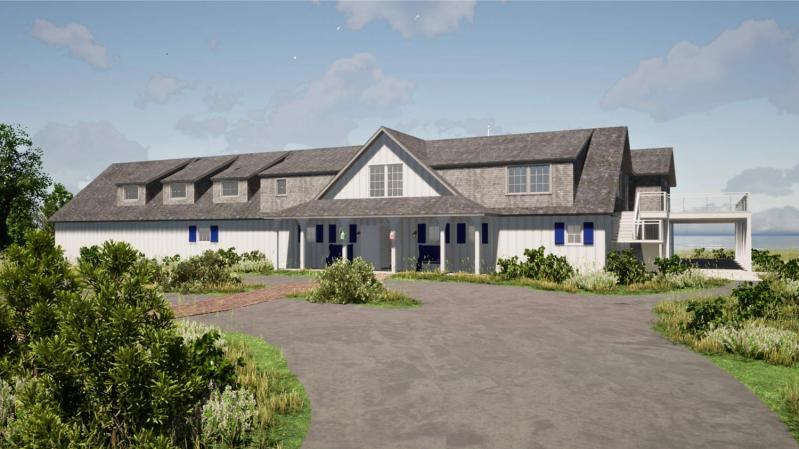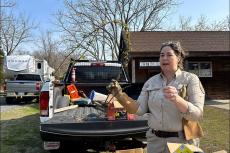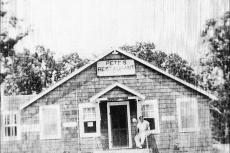Richard Warren had come to Monday night’s meeting of the Amagansett Citizens Advisory Committee prepared with whiteboard, blueprints, facts and figures, to discuss the modernization of the 108-year-old Devon Yacht Club. What Mr. Warren, president and owner of the environmental planning firm Inter-Science Research Associates, was not prepared for was the dustup that followed his presentation.
Mr. Warren’s goal that night was to win committee members’ support for the project, which, after almost five years in the works, is expected to have its initial hearing — a public hearing, he said, which is unusual for a first appearance — late next month, before the zoning board of appeals. Appearances before the architectural review board and the planning board will follow — this is a Hydra of an upgrade with many, many tentacles, requiring multiple variances and the approval of numerous agencies, not least the State Department of Environmental Conservation.
Advisory committee members were already somewhat familiar with the plan, this being the second time in a year that Mr. Warren has addressed them, and there was little doubt, when he finished an hourlong presentation, that the room was pretty solidly behind him. To that end, a voice in the crowd — and it was a crowd, 30 or so, including several members of Devon — proposed that ACAC send a letter of support to the town board.
Rona Klopman, chairwoman, shook her head. “This is a Z.B.A., A.R.B., planning board matter,” she said. “Not the town board. The committee cannot send a letter, only individuals.”
“Then why are we having this presentation?” Michael Jordan inquired — reasonably, judging by some nods and scattered applause.
“Very few projects of this size have come before us,” Ms. Klopman replied. “We are interested as community members.”
“This is not the town board’s jurisdiction,” she repeated. “Tom [Councilman Tom Flight, the board’s liaison to the committee] can report back that we discussed it, but I [as chairwoman] cannot bring an opinion.”
The gulf between advisory committees and the town board, though little known and perhaps less understood, was enshrined in local law in 2010 under a Republican administration, and has remained in effect ever since. Some, like Ms. Klopman, maintain that its goal was to limit the power of the committees, or, as former Councilman Jeff Bragman suggested Tuesday when asked for clarification, to “neutralize” them. (Five years ago, for example, a Democratic town board removed a member of the Wainscott committee after he wrote to the Suffolk County Legislature objecting — in the committee’s name — to a proposed wind farm off Beach Lane there, since built.)
In any event, because of that law, Ms. Klopman reiterated, advisory committee members can support Devon’s plan or any other, but only as individuals, before the boards that will conduct the coming hearings.
Jaine Mehring, who sits on one of them (the zoning board), seconded that. “This law is one of the most important bulwarks between committees and the town board,” she said.
Tom Field, a member, summed it up. “We are not under a gag order,” he said. “Share this information with your friends and neighbors, they can write in support.” Speaking for “the fishing community,” he added, “I have yet to hear a negative comment about this project.”
Mr. Warren, looking a bit bemused, departed to a round of applause. Next on the agenda was a discussion about the hamlet’s newest proposed public amenity, a pocket park of just over an acre, to be connected via walkway to the municipal parking lot behind Main Street.
Mr. Jordan, who heads the town’s nature committee that developed the plan, called it a “nature preserve park” open 365 days a year, but almost before he finished speaking there were questions. What about dogs? A playground? Picnic benches? Special events? Weddings?
Dogs drew the most attention. Mr. Jordan did not sound keen on the idea — “I don’t know if you want dogs running around if there’s picnic benches,” he said mildly. But why not dogs on a leash? Bill DiScipio asked.
Ms. Mehring agreed. A park, she said, is “not like a destination,” such as a shop or a place to pick up a sandwich. “People will use it to sit and eat — and they bring their dogs to town. So what would they do with the dogs?”
The area is overgrown now, and will have to be cleared. There will be grass, eventually, said Mr. Jordan, but that too was debated.
“Why grass? Ms. Mehring demanded. “Why not pollinators? Why not oak trees? Why not regenerate the property?”
Mr. Field, whose father, Herbert, donated part of the parkland to the town, recalled that “in 1966, there was corn planted there. No trees. Anything there now is a weed. If you’re too ‘natural,’ you’re going to have chiggers.”
The discussion lasted about 10 minutes and was inconclusive; the town board will have the last word on the park’s appearance.
As the clock was ticking toward 8:30, when the Amagansett School staff hoped to close the building, Councilman Flight delivered his report. There has been confusion about the R2 firm, the architects of the proposed senior center, he said. “The website R2 Architecture PLC.com takes you to the correct address,” he explained. “The website R2 Architects takes you to a company that builds casinos.”
He then recited some police statistics pertaining to bad auto accidents occurring in the hamlet from 2019 to 2024. By far the most, 20, happened at the Abram’s Landing Road-Old Stone Highway intersection. At the corners of Main Street, there were eight accidents off Windmill Lane in those five years, seven off Indian Wells Highway, one off Hedges Lane, three off Miankoma, one off Hand, and three off Atlantic Avenue.
Finally, someone reported that the Mobil gas station at the west end of Main Street has been sold, and that there’s a trailer on the site in which people are sleeping.
“Are they building a convenience store? Is someone allowed to put up a trailer and live in it?” somebody wondered. The question was left on the floor as the meeting ended.




